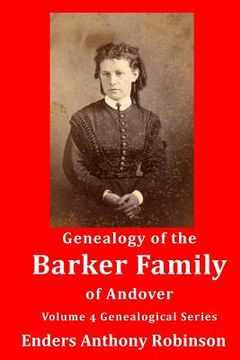Genealogy of the Barker Family of Andover: Volume 4 Genealogical Series (en Inglés)
Reseña del libro "Genealogy of the Barker Family of Andover: Volume 4 Genealogical Series (en Inglés)"
In early modern Europe it was generally believed that the Devil employed his hellish agents to plague and tempt the select of God. The consequences were witchcraft trials which culminated in Salem in 1692. What is unique about Salem is that it occurred well after the great European witchcraft epidemics had ceased. In Europe by the year 1650, people were turning to explanations of natural phenomena based on scientific experimentation. The settlers in New England participated in this intellectual awakening. They accepted science as an ally, believing that scientific truth could not clash with revealed truth. One of the earliest New England scientists was John Winthrop, Jr. Widely traveled, he brought the first astronomical telescope to America. Winthrop's observations of American fauna and flora were published in the Philosophical Transactions of the Royal Society in 1670. Thomas Brattle, a New England merchant, was a mathematician and an amateur astronomer. He made observations of Halley's Comet, of eclipses of the sun and moon, and of variations of the magnetic needle. His contributions won the attention of Sir Isaac Newton. In 1688 in England, Sir Isaac Newton published Principia Mathematica. This book initiated the scientific study of the visible universe. In 1689 in New England, Cotton Mather published Memorable Providences Relating to Witchcraft and Possessions. This book was Cotton Mather's first attempt to give a scientific account of the invisible universe of the Devil. In Latin, he wrote, "Haec ipse miserrima vidi," or "These things these wretched eyes beheld." Together with his numerous sermons and pamphlets, his book represented a major effort to instill in the minds of the people a belief in the reality of witchcraft and a fear of witches. The result is that the name of Cotton Mather is the name most enduringly linked to episode of Salem witchcraft in 1692. The English Puritans had moved to New England in order to gain the liberty to worship God as they chose. Their aim was to form orderly communities "without pope, prelate, presbytery, prince, or parliament." However, with the establishment of any organized system, there are always voices of dissent. In 1692 William Barker, a resident of Andover, was arrested for witchcraft. His confession, in part, reads: "He confesses he has been in the snare of the devil three years. That the devil first appeared to him like a black man and perceived he had a cloven foot. That the devil demanded of him to give up himself Soul & Body unto him, which he promised to do. Barker said he had a great family; the world went hard with him and was willing to pay every man his own. Barker confesses he was at a meeting of witches at Salem Village where he judges there were about a hundred of them. Satan's design was to set up his own worship, abolish all the churches in the land, to fall next upon Salem and so go through the country. He saith the devil promised that all his people should live bravely, that all persons should be equal; that there should be no day of resurrection or of judgement, and neither punishment nor shame for sin." Barker's words, "People should live bravely, that all persons should be equal," represented an expression of the idea of freedom. In 1776, this sentiment was more clearly expressed by Thomas Jefferson: "We hold these truths to be self-evident, that all men are created equal." The wisdom of William Barker and Thomas Jefferson won the day, not the notions of Cotton Mather.

